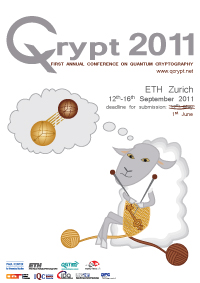|
|||||||||||
Experimental quantum coin flipping in the presence of loss
Guido Berlin (Université de Montréal), Gilles Brassard (Université de Montréal), Félix Bussières (University of Geneva), Nicolas Godbout (École Polytechnique de Montréal), Joshua A. Slater (University of Calgary) and Wolfgang Tittel (University of Calgary)
Coin flipping is a cryptographic primitive in which two distrustful parties wish to generate a random bit in order to choose between two alternatives. This task is impossible to realize when it relies solely on the asynchronous exchange of classical bits: one dishonest player has complete control over the final outcome. It is only when coin flipping is supplemented with quantum communication that this problem can be alleviated, although partial bias remains. Unfortunately, practical systems are subject to loss of quantum data, which allows a cheater to force a bias that is complete or arbitrarily close to complete in all previous protocols and implementations. In this talk we will report on the experimental demonstration of a quantum coin-flipping protocol for which loss cannot be exploited to cheat better, thereby thwarting loss-related attacks for the first time.
Wichtiger Hinweis:
Diese Website wird in älteren Versionen von Netscape ohne
graphische Elemente dargestellt. Die Funktionalität der
Website ist aber trotzdem gewährleistet. Wenn Sie diese
Website regelmässig benutzen, empfehlen wir Ihnen, auf
Ihrem Computer einen aktuellen Browser zu installieren. Weitere
Informationen finden Sie auf
folgender
Seite.
Important Note:
The content in this site is accessible to any browser or
Internet device, however, some graphics will display correctly
only in the newer versions of Netscape. To get the most out of
our site we suggest you upgrade to a newer browser.
More
information







